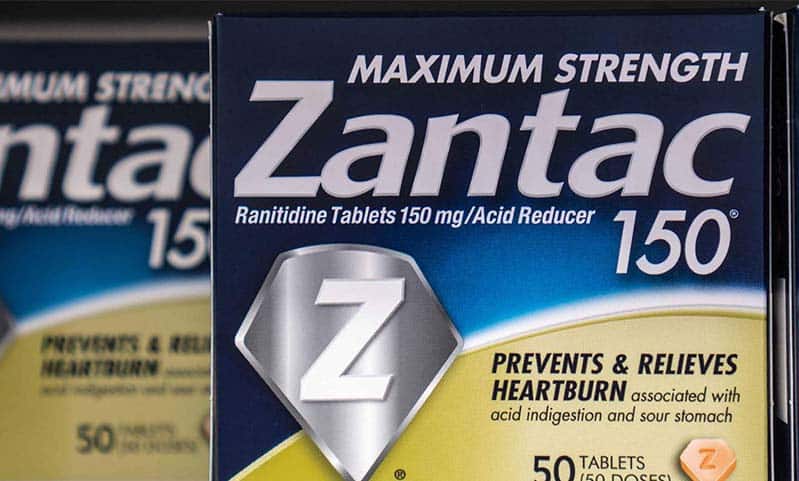Recent evidence links the popular heartburn medication to an increased cancer risk, thus FDA demands Zantac recall. The agency wants all ranitidine off store shelves effective immediately.
Currently, the Food and Drug Administration is sending letters to Sanofi and other ranitidine manufactures asking them to stop making and shipping product.
Additionally, the FDA advises consumers to immediately stop taking over-the-counter Zantac and destroy any unused pills.
The agency’s website includes instructions for safe disposal during the coronavirus outbreak.
People taking prescription Zantac should contact their physicians for instructions.
In a statement, the company acknowledged that there were some “inconsistencies in preliminary test results.”
Why Do Dangerous Drugs Make it to Market?
Lawmakers created what would become the Food and Drug Administration a little over a hundred years ago.
At that time, it was legal to sell anything to anyone.
“Snake oil” travelling vendors were almost everywhere. Furthermore, Bayer packaged heroin and sold it as a children’s cough suppressant.
For a while, the FDA was an effective and fully independent watchdog, much like the Occupational Safety and Health Administration and some similar agencies.
Now, things are different. User fees account for over a third of the FDA’s budget.
In other words, the drug companies the FDA regulates keep the agency operating from a financial perspective.
So, these bureaucrats do not ask too many questions during the drug development process.
The more drugs make it to market, the more money drug companies make, and the more money the FDA receives.
Additionally, for these same reasons, the FDA only orders product recalls in extreme situations. So, if the agency pulled or ordered a Zantac recall, it’s obviously because the risk was extremely high.
Unfortunately, the Zantac recall comes too late for the millions of people who have taken Zantac and been exposed to a dangerous chemical.
Zantac and NDMA
N-Nitrosodimethylamine is usually a by-product of certain manufacturing and purification processes.
So, NDMA is rather common in treated water and cured meat. This chemical is a known carcinogen. It has produced tumors in laboratory animals.
At extremely low levels of about nine nanograms per liter, NDMA is not harmful. The levels in Zantac were about ten times that high.
During development, the FDA requested NDMA levels in the drug itself and also after the drug was exposed to stomach acid.
But regulators did not test the effects of extended room temperature storage, even though unused Zantac usually sits in the medicine cabinet for weeks or months and Zantac’s label instructs users to store it in this way.
As it turns out, prolonged room temperature storage changed the medicine’s chemical structure, causing NDMA levels to spike at alarmingly high levels.
Prior to this move to recall Zanta, the FDA approved Zantac in 1983. Since 2007, it has consistently been one of the most prescribed drugs on the market, with about seventeen million prescriptions per year.
Regulators first scrutinized the ranitidine/NDMA link in 2019, but they were unable to pinpoint a cause until now. Curiously, some similar drugs, like famotidine (Pepcid) and omeprazole (Prilosec), do not have elevated NDMA levels.
Liability for Dangerous Drugs
Most injury claims, such as car crashes and medical misdiagnosis, involve negligence, or a lack of care. Victims are entitled to compensation if the defendant was negligent in some way.
But dangerous drug claims are different, largely because they affect so many people and the potential effects are so serious.
Manufacturers are strictly liable for the illnesses or injuries their dangerous products cause.
Negligence, or lack thereof, is only relevant in terms of the amount of compensation awarded.
More on that below. Instead, victims must only establish a causal link by a preponderance of the evidence (more likely than not). That’s the lowest standard of evidence in New York.
Although the legal elements are rather straightforward and the burden of proof is low, it’s often rather difficult to prove these cases in court.
Sanofi and other large drug manufacturers have almost limitless resources.
Therefore, these companies can easily find expert witnesses who testify that the drug is as safe as mother’s milk.
When it comes to expert witness evaluation, New York uses a more relaxed standard than some other states.
So, a New York personal injury attorney has a wider choice of experts who testify about the drug’s link to cancer or whatever.
An attorney can partner with experts who are not only knowledgeable in the field but also very persuasive in court.
Compensation in a dangerous drug case usually includes more than just money for economic losses, such as medical bills, and noneconomic losses, such as pain and suffering.
Frequently, juries award significant punitive damages in these cases.
Such additional compensation is available if there is clear and convincing evidence that the defendant intentionally disregarded a known risk.
If you or a loved one has ever taken Zantac, contact Napoli Shkolnik PLLC for a free consultation.
Our professionals will evaluate your case and arrange for a cancer screening or other medical exam, if necessary.
